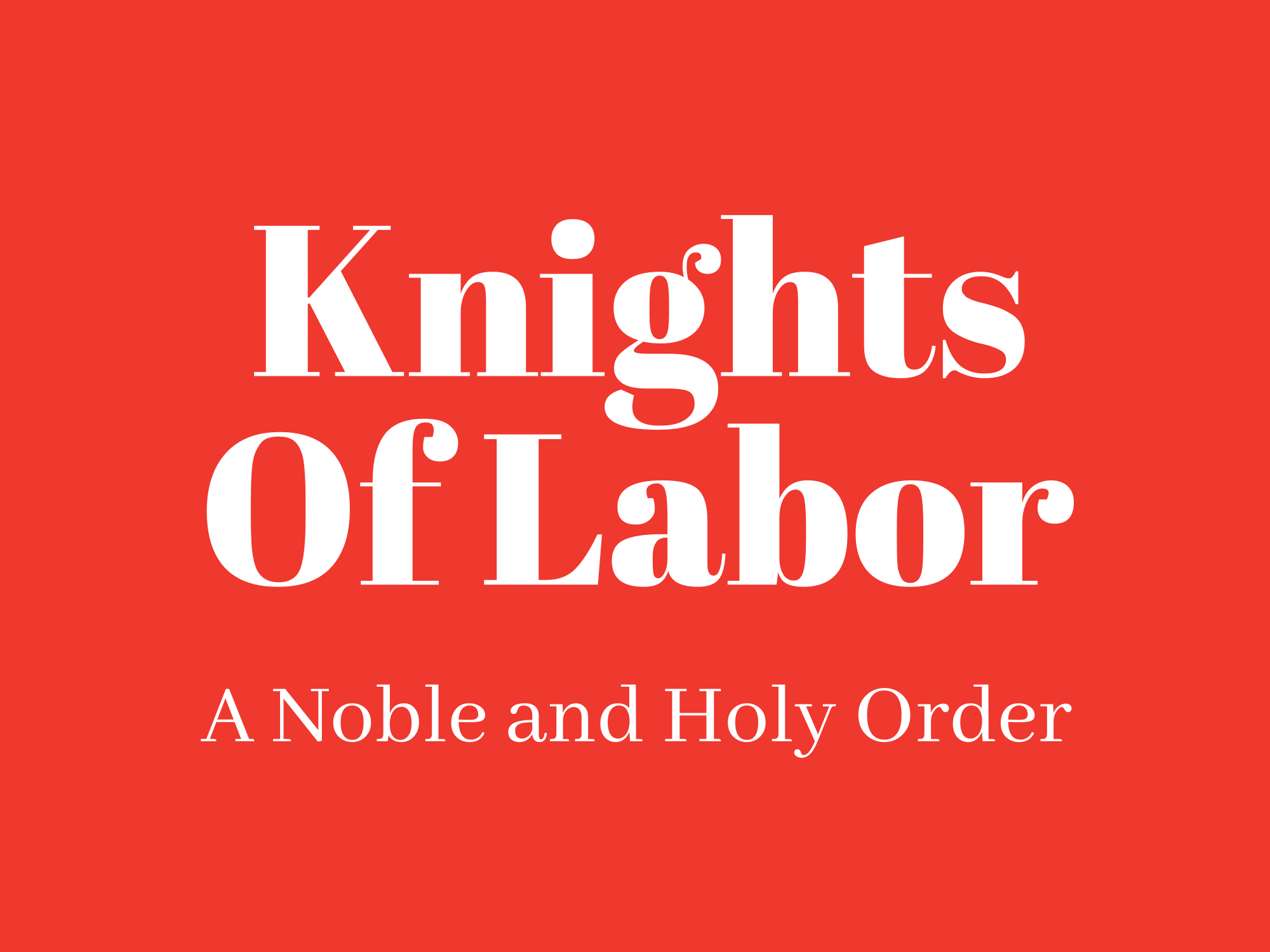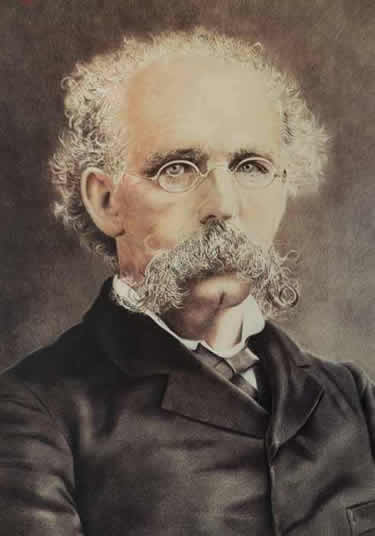Noble and Holy Order
of the Knights of Labor


The Knights of Labor was a prominent American labor union in the late 19th century that advocated for significant worker rights improvements,
including shorter workdays, ending child labor, and promoting equal pay for women, aiming to achieve broader social and economic reforms beyond just wages.

The Knights of Labor was open to a wide range of workers, including women, immigrants, and African Americans, unlike most unions at the time.
Unlike many other unions at the time, the Knights of Labor aimed for wide-ranging societal changes, not just better working conditions for specific skilled trades.
Membership
Unlike many other unions at the time, the Knights welcomed workers regardless of skill level, race, or gender, including women and African Americans.
Goals
Their primary goals included establishing an eight-hour workday, ending child labor, improving working conditions, and advocating for equal pay for women.
Social Reform Focus
Beyond just wages, the Knights actively pursued broader social and economic reforms, sometimes even supporting cooperative ownership of businesses.
Decline
The Knights of Labor saw a significant decline after the Haymarket Affair in 1886, a violent labor protest in Chicago that tarnished the organization’s reputation.
It was a Noble and Holy Order That Functioned as a Union but today The Labor Movement doesn’t need another union… It needs a community that allows working class people to connect and engage with one another. Not devided by profession, region, country or anything else but united under one banner. A Noble and Holy banner working to make the world a better place.
Having a larger, interconnected social network among labor union members can provide significant benefits in terms of collective bargaining power and the ability to enact meaningful change. When members of different unions are able to connect and communicate with one another, it creates a broader base of support and a louder, more unified voice that can be leveraged during negotiations with employers. This cross-pollination of ideas, resources, and solidarity across union lines helps to strengthen the overall labor movement and gives workers more leverage to demand better wages, benefits, and working conditions. Additionally, a robust social network allows union members to share strategies, coordinate actions, and provide mutual aid and support – such as organizing strikes, boycotts, or other forms of collective action – that can be more effective when undertaken collaboratively rather than in isolation. Furthermore, the relationships and trust built through these social connections can transcend individual workplaces or industries, fostering a sense of shared struggle and a commitment to the broader fight for workers’ rights. Ultimately, the power of a larger, more extensive social network among labor union members lies in the ability to pool their collective strength, amplify their collective voice, and enact more impactful, wide-reaching changes that benefit the working class as a whole.
United States Department of Labor
Hall of Honor Inductee
Terence V. Powderly
“The revolution inaugurated by the Knights of Labor… won more for the cause of human liberty than the revolutions which spilled the blood of humanity’s advocates through all the centuries of time.”
Terence V. Powderly (1849 — 1924)
As leader of the Knights of Labor, the nation’s first successful trade union organization, Terence V. Powderly thrust the workers’ needs to the fore for the first time in U.S. history. In the 1800s, far in advance for the period, he sought the inclusion of blacks, women and Hispanics for full-fledged membership in his trade union. With labor struggling for a place at America’s economic table, Powderly achieved national stature as the recognized spokesman for the workers’ interest and for the first time made organized labor a political force to be reckoned with.
“If you owe a man a dollar, pay it; if you owe him a grudge, forget it, and always be kind.”
— Terence V. Powderly
The Knights of Labor: A Noble and Holy Order
The Knights of Labor, often referred to as a noble and holy order, were a pivotal force in the history of labor movements in the United States. Their ideals and actions left an indelible mark on the labor landscape, influencing future movements and continuing to inspire labor activists today.
Origins and Ideals
Founded in 1869 by Uriah Stephens and a group of Philadelphia garment workers, the Knights of Labor emerged as a response to the harsh conditions faced by workers during the Industrial Revolution. Their mission was to unite workers across different trades and industries under a single banner, advocating for improved working conditions, fair wages, and the eight-hour workday.
Core Principles
The organization embraced several core principles that set it apart from other labor groups at the time:
- Inclusivity: Unlike many labor organizations of the era, the Knights of Labor welcomed workers of all skill levels, genders, and races (though they faced internal challenges with this inclusivity in practice).
- Cooperation: They promoted cooperative enterprises, encouraging workers to own and operate businesses collectively.
- Political Action: They believed in the power of political engagement to achieve legislative reforms that would benefit the working class.
Achievements and Challenges
The Knights of Labor reached the height of their influence in the mid-1880s, boasting a membership of nearly 700,000. This growth was facilitated by their successful strikes and advocacy efforts, which brought about significant improvements in labor laws and working conditions.
Key Achievements
- Legislative Successes: They were instrumental in the passage of laws that limited child labor and established safety regulations in workplaces.
- Public Awareness: The Knights raised awareness about labor issues, bringing the plight of workers to the forefront of national consciousness.
Challenges
Despite these successes, the Knights faced numerous challenges:
- Internal Strife: Disagreements over strategies and goals led to internal conflicts, weakening the organization’s unity.
- External Opposition: They encountered fierce resistance from employers and government entities, which often resulted in violent confrontations.
Legacy and Future Influence
Though the Knights of Labor declined in prominence by the late 19th century, their legacy lives on. They laid the groundwork for future labor movements, establishing principles and strategies that continue to influence labor activism today.
Enduring Influence
- Inspiration for Future Movements: Their inclusive approach and emphasis on broad-based worker solidarity inspired the formation of later organizations, such as the American Federation of Labor (AFL).
- Modern Relevance: The ideals of the Knights resonate in contemporary discussions about workers’ rights, equity, and the role of labor in a globalized economy.
The Knights of Labor may have been a product of their time, but their vision and dedication to improving the lives of workers endure as a guiding light for current and future labor movements. As we look to the future, the noble and holy order of the Knights remains a symbol of what can be achieved when workers unite for a common cause.
